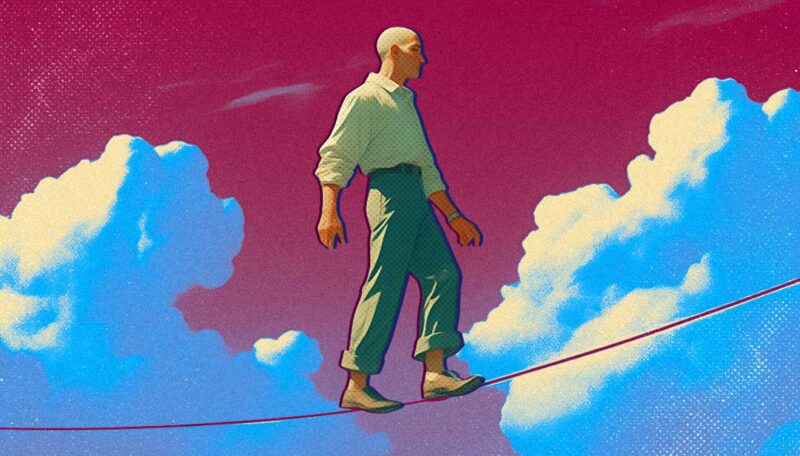Editorial
How ‘Hustle Culture’ is Dividing Us—and How We Can Stop It
Every morning at 8 a.m., I look out the window and see the same woman walking her dog with nothing in her ears. No podcast. No audiobook. No noise-cancelling armor against existence.
Just her, the leash, and her Maltese Poodle.
Everyone else on the sidewalk is marching through their 10,000-step quotas, AirPods securely planted in their ear canals, checking their smartwatches to make sure they’ve burned enough calories.
But she’s just… walking.
It feels like watching an act of defiance. To many in our highly optimized lives, her simple and silent routine would feel maddening. We have become repulsed by stillness. Obsessed with wringing every ounce of productivity from every moment of our lives.
We devour books on getting things done and maximizing personal efficiency. People brag about being “busy” like it’s a status symbol. Our hyper-efficient routines have been parodied endlessly online—the 5 a.m. cold plunges, the productivity gurus, the calendars packed with “micro-tasks.” But those routines come from a very real cultural push to squeeze productivity out of every hour.
This obsession with productivity has even seeped into our relationships. There’s a booming genre of self-help books, podcasts, and viral threads pushing the idea that your friends should increase your productivity and help you get ahead—if not, you should “optimize your circle” and cut them from your life. Dating apps train us to shop for potential partners like products, promising that a fast and easy connection with “the one” is just another swipe away.
You’d think with all this talk of “optimization”—of maximizing our calendars, tightening our routines, automating errands, and “leveling up” our relationships—that we’d be happier than ever. More fulfilled in our careers. More in love. Less lonely.
We’re not.
National surveys show that Americans are becoming lonelier than ever, with loneliness rising across generations and hitting historic highs in recent years.
At the same time, our obsession with self-optimization—quantified goals, habit tracking, productivity metrics—keeps growing. But despite being the most efficient generation in history, we are all plagued by a constant sense that we don’t have enough time to do it all. Researchers call this growing feeling time poverty.
Instead of freeing us, efficiency has put us in a chokehold. In our pursuit of making life more manageable, we have somehow made it less meaningful.
Our Obsession with Optimization Isn’t Just Exhausting—It’s Polarizing
There’s a hidden cost to all this over-engineered efficiency. It shrinks the number of opportunities to actually encounter people who are different from us.
If your schedule is rigid, algorithmic, and optimized to the minute, where do you meet people outside your curated bubble?
Everyone around you ends up being someone who made similar choices you did, which is a quiet accelerator of polarization.
Routines optimized for efficiency turn life into parallel lines that never intersect. You go from gym to work to home without stopping, save for the occasional, carefully vetted Hinge date at an algorithmically-recommended bar or restaurant. You don’t even need to go to the store—everything can be delivered straight to your doorstep. This mirrors social media’s echo chambers in the physical world, narrowing the diversity of interactions we have.
There’s no room in the optimized routine to talk with someone you wouldn’t have sought out on purpose. It removes opportunities for social friction, where empathy is actually built. Genuine empathy comes from small collisions with people unlike ourselves. The mom on the park bench, the older man in the bowling alley, the family speaking a different language at the grocery store.
Without those chance encounters, it becomes much harder to bridge divides. You can’t build trust with people you never meet.
Routine Isn’t the Enemy, But Hyper-Optimization Is
This mindset isn’t entirely our fault. Routine is healthy. Hard work matters. The desire to provide, contribute, and be useful is deeply human and good for society.
But taken to the extreme, the desire to eliminate “idle time” becomes a kind of social malnutrition.
When we treat time spent with people as “billable hours,” we stop seeing each other as human beings worth knowing for their own sake.
Here’s the irony: our strict routines didn’t come from a need to combat laziness. For many people, they came from that same lack of meaning they help reinforce.
When life feels uncertain or overwhelming, a hyper-efficient routine gives us structure. Predictability. Control. A way to feel like we’re not falling behind.
But a life with no friction is also a life with no texture.
Habits to Rest and Rebalance
If we truly want to bridge divides, we need to rebalance these carefully curated, hyperoptimized bubbles we’ve created. One way to push back against over-optimization is to build a little “unoptimized time” into your week—20 or 30 minutes where you stroll, sit outside, or simply exist in public with no agenda, giving chance encounters room to happen. You can also swap one efficiency habit for a connection habit: look up instead of checking your phone in line, or invite someone along on an errand you’d normally do alone. Small micro-interactions—saying hello to a neighbor, asking a barista a real question, offering a quick compliment—help rebuild the fragile ties that hold us together. And adding just one low-stakes, no-ROI activity, like a hobby you’re allowed to be bad at or a cookout with neighbors you don’t usually talk to, lets a little unpredictability back into your life.
These tiny, unoptimized moments make us more patient with difference, more curious about people outside our usual circles, and more comfortable having conversations with those we disagree with. In a world that’s sorting us into smaller and smaller tribes, small acts of everyday openness help widen the lens again. They remind us that most people are more than their politics, and that connection is still possible across any divide.
The slow walk. The unexpected conversation. The friend you didn’t plan to make. The love you didn’t expect to find. The detour that ended up mattering. The peaceful walk with your dog, where you can hear the wind rustling the trees.
These are the human moments that optimization quietly edges out.
Maybe the woman with no headphones—moving slowly, ignoring her watch, waiting patiently as her little white dog sniffs a lamppost—is not wasting time.
She’s making space for being alive.
—Alex Buscemi (abuscemi@buildersmovement.org)
Art by Matthew Lewis
Keep Reading

How ‘Hustle Culture’ is Dividing Us—and How We Can Stop It

Is Healthcare a Right or a Privilege? How the Healthcare Debate Misses the Point
